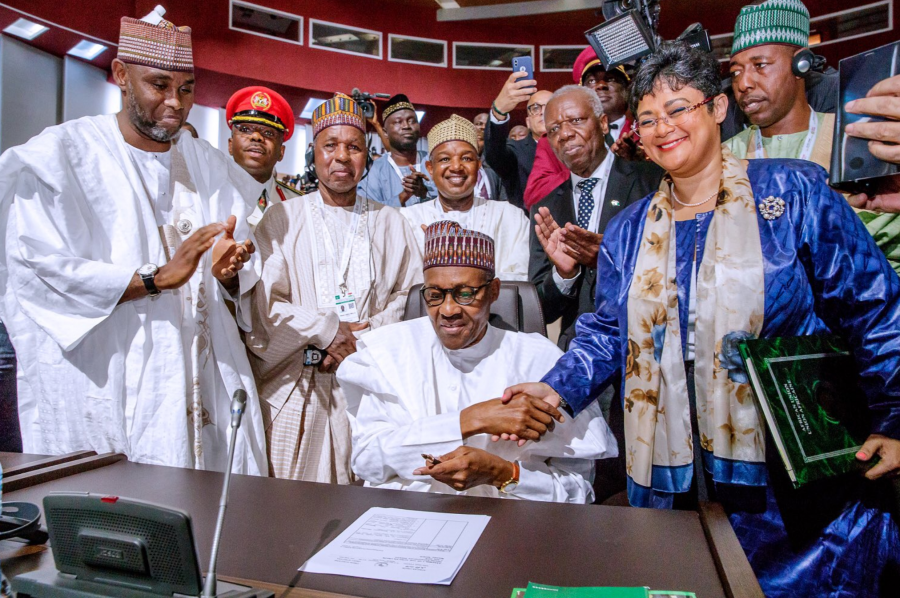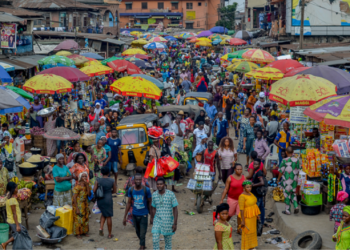Barely two weeks after President Muhammadu Buhari signed the African Continental Free Trade Agreement (AfCFTA), the Nigeria Employers’ Consultative Association (NECA) has stated that the nation has taken a great risk by signing the continental trade treaty, as struggling firms may fold up.
The Director-General of NECA, Mr. Timothy Olawale, reportedly disclosed this while speaking during a press briefing on Wednesday at the Presidential Villa, in Abuja, after the leadership of the association met with President Muhammadu Buhari.
The visit to the Presidency came against the heels of the Association’s 62nd Annual General Meeting held in Lagos on Tuesday, where NECA lamented that some government agencies were frustrating the ease of doing business in Nigeria through contradictory regulations.
The signing of AfCFTA: On Sunday, July 8, 2019, President Buhari signed AfCFTA, joining over 50 other African countries in ratifying what is being considered as the largest free trade agreement in any continent in the world.
- As widely reported, the trade treaty is expected to encourage trade relations in Africa by removing tariffs for over 90% of goods traded between member countries.
- However, concerns have been raised that Nigerian manufacturers will be exposed to dangers, following AfCFTA signing. Meanwhile, Nairametrics has provided a detailed analysis of the trade agreement’s cost and benefits, as touching businesses in Nigeria and the economy.

[READ: How AfCFTA affects every Nigerian Business]
Some issues raised: The Director-General of NECA noted that while AfCTA comes with some inherent benefits, the potential damage on the economy may be too costly. According to Mr. Olawale, Nigeria’s economy is too fragile for the treaty.
“Those issues border on those variables that will ensure the competitiveness of Nigerian businesses and industry. We don’t want a situation where our businesses are not competitive due to the disadvantaged environment they operate.
“Of course, we are all familiar with the disadvantaged environment with regards to the issue of infrastructure, among which is power and the issue of the road network – that is, transportation for goods and services and accessibility to the different business environments.”
On Nigeria’s manufacturing sector, the NECA Director stated that AfCFTA signing would formally turn Nigeria into a dumping ground, if not properly handled, and this may affect struggling firms to eventually fold up. He cited the textile industry as an example.
“What we are saying is that if all these issues are not addressed properly, to make our business competitive, definitely we are going to be at the receiving end, to the extent that our nation will become a dumping ground. Some of the factories that are even struggling presently may end up folding up.
“Of course, we know the history of the textile sector and that can be repeated in any other sector and we don’t want us to get to that extent. That is why we are saying the government should put mechanisms in place to address these issues so that we can be competitive and take our rightful place by maximising the benefits of the AfCFTA.”
The Bottom line: It should be noted that NECA was one of the associations consulted by the Federal Government before President Buhari arrived at the decision to sign AfCFTA. What this implies is that the Federal Government is aware of the costs of the continental trade agreement.
Hence, just like NACA as rightly noted, all hands must be on deck, to ensure that the Nigerian economy is not trapped in the negative spillovers of signing AfCFTA.
[READ FURTHER: Signing AfCTA agreement; Our concerns for Nigeria]



















Nairametrics and all these economic commentatirs are just hypocritical…. PMB initially withheld his signature because of these concerns but all you economic analysts ridiculed him for withholding his signature… Now that he has signed it, relity just dawned on you guys…..
Anybody that just puts in minimal thought into this AFCTA would realise that all countries(china inclusive) are gunning for the large consumer market in Nigeria…. we have poor borser control, poor customs enforcement, the organization responsible for checking quality would be overwhelmed. There is hardly anything we can do to check these things..